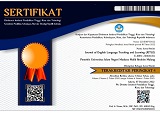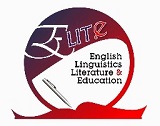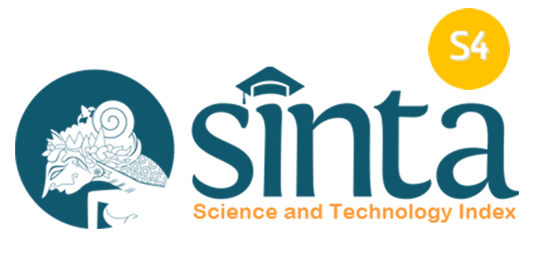Exploring Blended Learning in Higher Education: Different Definitions and Teachers’ Perceptions
Abstract
The interest in and research on blended learning have increased and developed in the last two decades. This study addresses the topic of blended learning particularly exploring the different definitions of blended learning and the views of teachers on blended learning courses. By locating papers on blended learning using specific databases, this systematic study appraises peer-reviewed articles published between 2000 and 2019. After examining the full papers, 32 studies are then selected as they meet all inclusion criteria and answer the research questions. The findings of this study indicate that blended learning is not a homogenous concept since it means different thing to different people. Besides, teachers in the blended courses experience several challenges, hence constant supports and persistent effort from all the components including the related institution should be given to achieve the potential benefits of this learning mode.
Keywords:
Blended learning, higher education, teacher perception
Full Text:
PDFReferences
Adams, R. V, & Blair, E. (2016). The learner-generated podcast : engaging postgraduate engineering students in a mathematics-intensive course. Research in Post-Compulsory Education, 19(2), 132–146. https://doi.org/10.1080/13596748.2014.897502
Adriana, L., Gómez, O., & Duart, J. M. (2012). A hybrid approach to university subject learning activities, 43(2), 259–271. https://doi.org/10.1111/j.1467-8535.2011.01175.x
Akyol, Z., Garrison, D. R., & Ozden, M. Y. (2009). Online and Blended Communities of Inquiry: Exploring the Developmental and Perceptional Differences. International Review of Research in Open and Distance Learning, 10(6), 65–84.
Alammary, A., Sheard, J., & Carbone, A. (2014). Blended learning in higher education : Three different design approaches. Australasian Journal of Educationa; Technology, 30(4), 440–454.
Bogaard, M. Van Den, Graaff, E. De, & Dekeyser, H. (2009). Making Connections : A Blended Learning Approach to the Delft UT International Master Students Introduction Program, 1–6.
Boland, A., Cherry, M. G., & Dickson, R. (2014). Doing a Systematic Review: A Student’s Guide. London: SAGE.
Bower, M., Kenney, J., Dalgarno, B., Lee, M. J. W., & Kennedy, G. E. (2014). Patterns and principles for blended synchronous learning : Engaging remote and face-to-face learners in rich-media real-time collaborative activities. Australasian Journal of Educational Technology, 30(3), 261–272.
Braeckman, L. A., Fieuw, A. M., & Bogaert, H. J. Van. (2016). A Web- and Case-based Learning Program for Postgraduate Students in Occupational Medicine. International Journal of Occupational and Environmental Health, 14(1), 51–56. https://doi.org/10.1179/oeh.2008.14.1.51
Caner, M. (2012). The Definition of Blended Learning in Higher Education, 19–34. https://doi.org/10.4018/978-1-4666-0939-6.ch002
Carter, M. A., Pagliano, P., Knight, C., & Goldie, D. (2016). An Exploratory Study in Postgraduate in Australia and Singapore Learning about Blended Learning through Students ’ Experiences : In Mobile and blended learning innovations for improved learning outcomes (pp. 60–83). https://doi.org/10.4018/978-1-5225-0359-0.ch004
Dengler, M. (2016). Classroom Active Learning Complemented by an Online Discussion Forum to Teach Sustainability. Journal of Geography in Higher Education, 32(3), 481–494. https://doi.org/10.1080/03098260701514108
Donnelly, R. (2016). Blended problem ‐ based learning for teacher education : lessons learnt, 13(2), 93–116. https://doi.org/10.1080/17439880600756621
El-Mowafy, A., Kuhn, M., & Snow, T. (2013). Blended learning in higher education : Current and future challenges in surveying education. Issues in Educational Research, 23(2), 132–150.
Fibiger, B., Nielsen, J., Sorensen, E. K., & Riis, M. (2005). Program in ICT and Learning Project Learning and Virtual Collaboration - A Master, 3(1), 15–22.
Frantz, J., Himalowa, S., Karuguti, W., Kumurenzi, A., Mulenga, D., & Sakala, M. (2011). Challenges and opportunities related to postgraduate evidence-based practice module using blended learning. AJHPE, 3(1), 15–18.
Freeman, R., & Johanson, K. (2007). A case for blended and collaborative learning as strategies for teaching editing and publishing within a postgraduate writing program. Massey University.
Galway, L. P., & Sciences, H. (2015). Student perceptions and lessons learned from flipping a master ’s level environmental and occupational health course. Canadian Journal of Learning and Technology, 41(2), 1–16.
Garcia, A., Abrego, J., & Calvillo, M. (2014). A Study of the of Hybrid Instructional Delivery for Graduate Students in an Educational Leadership Course. International Journal of E-Learning and Distance Education, 29(1), 1–15.
Garrison, D. R., & Kanuka, H. (2004). Blended learning : Uncovering its transformative potential in higher education, 7, 95–105. https://doi.org/10.1016/j.iheduc.2004.02.001
Geraghty, S. (2016). Evaluating postgraduate midwifery students ’ experiences of a model of blended learning, 24(1), 60–63.
Hoadley, E. D. (2009). Teaching A Hybrid MBA Course : A Case Study In Information Technology from the Student Perspective. American Journal of Business Education, 2(6), 61–68.
Hoic-Bozic, N., Mornar, V., & Boticki, I. (2009). A Blended Learning Approach to Course Design and Implementation. IEEE Transactions on Education, 52(1), 19–30.
Howitt, C., & Pegrum, M. (2015). Implementing a flipped classroom approach in postgraduate education : An unexpected journey into pedagogical redesign. Australasian Journal of Educational Technology, 31(4), 458–469.
Jesson, J., Matheson, L., & Lacey, M. F. (2011). Doing your literature review: Traditional and systematic techniques. Los Angeles: SAGE.
Johnston, N., & Karafotias, T. (2016). Flipping the Classroom to Meet the Diverse Learning Needs of Library and Information Studies (LIS) Students. Journal of Education for Library and Information Science, 57(3), 226–238. https://doi.org/10.12783/issn.2328-2967/57/3/1
Kian-Sam, H., & Lee, J. A. C. (2008). Postgraduate students ’ knowledge construction during asynchronous computer conferences in a blended learning environment : A Malaysian experience. Australasian Journal of Educational Technology, 24(1), 91–107.
Mitchell, P., & Forer, P. (2016). Blended Learning : The Perceptions of First-year Geography Students. Journal of Geography in Higher Education, 34(1), 77–89. https://doi.org/10.1080/03098260902982484
Mtebe, J. S., & Raphael, C. (2013). Students ’ experiences and challenges of blended learning at the University of Dar es Salaam , Tanzania. International Journal of Education and Development Using Information and Communication Technology, 9(3), 124–136.
Ng, E. M. W. (2008). Engaging Student Teachers in Peer Learning via a Blended Learning Environment. Issues in Informing Science and Information Technology, 5, 325–334.
Ocak, M. A. (2011). Computers & Education Why are faculty members not teaching blended courses? Insights from faculty members. Computers & Education, 56(3), 689–699. https://doi.org/10.1016/j.compedu.2010.10.011
Oliver, M., & Trigwell, K. (2005). Can ‘Blended Learning’ Be Redeemed? E-Learning, 2(1), 17–26.
Picciano, A. G. (2009). Blending with Purpose: The Multimodal Model. Journal of Asynchronous Learning Networks, 13(1), 7–18.
Shaqour, A. Z. (2014). Faculty Members ’ Views towards Blended Learning , the Case of a Najah National University Master Program Teachers in the College of Education and Teacher Preparation. International Journal of Humanities and Social Science, 4(7), 17–18.
Tambouris, E., Zotou, M., & Tarabanis, K. (2014). Towards designing cognitively-enriched project-oriented courses within a blended problem-based learning context. Education and Information Technologies, 19(1), 61–86. https://doi.org/10.1007/s10639-012-9209-9
DOI: https://doi.org/10.18860/jetle.v1i2.9172
Refbacks
- There are currently no refbacks.
Jalan Gajayana 50 Malang 65144, Jawa Timur, Indonesia

This work is licensed under a Creative Commons Attribution-ShareAlike 4.0 International License.
Indexed by





